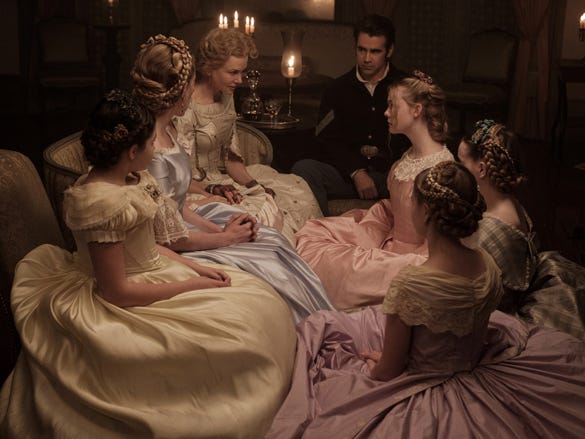The Beguiled
There’s something missing from Sofia Coppola’s remake of “The Beguiled.”
It’s something that’s hard to pinpoint, too. I watched the 1971 original, directed by Don Siegel and starring Clint Eastwood and Geraldine Page, immediately after leaving Coppola’s to see if that one had the answers I was looking for. But the two are such different animals that, barring a straightforward compare and contrast, the original didn’t solve the problem of Sofia.

If I’m sure of anything about “The Beguiled,” it’s that everything about it is beautiful. Coppola fills the film with ethereal shots of Miss Farnsworth’s Seminary for Young Ladies which accentuate just how isolated this Virginia plantation has become thanks to the Civil War. The Seminary is virtually empty, its slaves gone, its gardens overgrown, and its women elegant but hollowed out with waiting. The air is thick and heavy and Southern. Coppola is at her best here, creating atmosphere.
The cast, in every way an upgrade from the original, also adds to the film’s beauty. Has Nicole Kidman ever been more resplendent than she is here as the eponymous Miss Martha Farnsworth, or Kirsten Dunst more lovely as the quietly trapped Miss Edwina? Similarly, Colin Farrell is a perfect choice for the dangerously alluring Corporal John McBurney, the wounded yankee who stumbles into the women’s lives, as is Elle Fanning for Jane, a bored and lustful teenager. They and the rest of the girls (including Angourie Rice, a standout talent since last year’s “The Nice Guys”) paint a picture so pretty it’s easy to forget there’s not much else here.
The script, also written by Coppola, strips personality and history (and dedication to the Southern Cause) from each of the women, which also strips them of motivation. Miss Martha makes crucial decisions because the plot requires her to, and Miss Edwina’s affection for McBurney is even more perplexing here than it is in the original. McBurney is the strongest presence in both character and script, but even then he’s missing something.
Again, it’s hard to pinpoint what exactly, until you consider a significant player in the original who is missing in Coppola’s film: Hallie, Miss Martha’s slave. Coppola ostensibly removed her from the narrative because she was smart enough to realize that, as a white women, she is not equipped as a writer or a director to bring such a character to life in a way that isn’t offensive. It’s hard not to fault her for knowing her limits.
However, without the Hallie character, and with a line that informs us that “the slaves left” within the first minutes of the film, “The Beguiled” becomes a story half-told. Before the war, white women in the South had power over nothing except their slaves, and white men from the North were just as racist as their Southern foes. Hallie’s scenes in the original bring those ugly truths to light in no uncertain terms. Without them, Miss Martha seems adrift, and McBurney lacks the ugliness of Eastwood’s counterpart, which makes his ultimate fate seem both anticlimactic and more or less undeserved.
And all of this leads me to a challenging question. In modern Civil War movies, is it more offensive to co-opt black pain and black history for a white character as Gary Ross did in “Free State of Jones” (2016), or to erase black people from the narrative completely as Coppola does here in “The Beguiled?” I don’t have an answer. But I do believe that both are very, very wrong, and that white directors should probably think quite a bit harder before they decide to helm such projects in the future. But it’s been 78 years since “Gone With the Wind” and Hollywood loves a good (read: simple and apolitical) Civil War story, so chances aren’t great.
Still, intentionally or not, erasure ultimately provides Coppola’s film with a point. She shows us that upper class white women can get away with anything, even murder, and come through unscathed. Because of this, “The Beguiled” isn’t really a feminist revision of a Southern gothic psychosexual horror story. It’s just a story about white women maintaining a status quo that never gave them much agency to begin with.
Like the women it depicts, “The Beguiled” is beautiful, but it’s hollow. That seems to be Sofia Coppola’s specialty.


